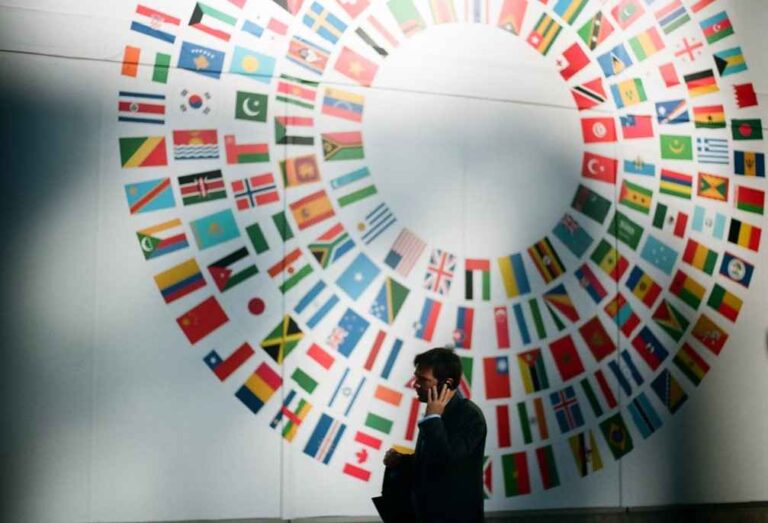The United Nations (UN) stands as the paramount intergovernmental organization globally, boasting a membership of 193 member states alongside two permanent non-member observer states, Palestine and Vatican City/Holy See.
Ensuring equal representation, each member state holds a voice in the UN General Assembly. Established in 1945 post-World War II, the UN’s core mission revolves around sustaining international peace and security, achieved through conflict prevention, mediation, and the establishment of peaceful conditions.
Moreover, the UN champions human rights protection, delivers humanitarian aid, upholds international law, and advocates for sustainable development.
Table of Contents
The founding members of the UN
Crafted by the United States, United Kingdom, Russia, and China, the UN Charter emerged after WWII, signed by 50 nations on June 26, 1945. Poland, though absent initially, joined as the 51st founding member on October 15, 1945.
With the charter coming into effect on October 24, 1945, the UN and its affiliated International Court of Justice were officially inaugurated. Over time, shifts in membership occurred, with some founding members dissolved (Czechoslovakia, Yugoslavia, Soviet Union) and others replaced or renamed.
Presently, the UN boasts 193 member nations, with the criteria for admission straightforward: an aspiring state submits an application committing to the UN Charter’s obligations. The UN Security Council, including five permanent and rotating members, then assesses eligibility, followed by a General Assembly vote, mandating a two-thirds majority for admission.
Countries not in the United Nations
While rare, a few territories exist outside UN membership. Two “permanent non-member observer states,” Holy See/Vatican City and Palestine, exemplify this. Both enjoy benefits and services but lack voting rights. Notably, they hold potential for full membership, albeit hindered by unique circumstances.
Holy See/Vatican City
As the Catholic Church’s global headquarters and the world’s smallest independent nation, Vatican City, governed by the Holy See, opts against UN membership.
The rationale behind this choice revolves around preserving non-interference in international affairs. However, challenges arise concerning Vatican City’s statehood and its role in global security.
Palestine
Despite multiple UN membership applications, Palestine retains permanent observer status due to an unresolved conflict with Israel.
While majority recognition supports statehood, opposition from pivotal Security Council members inhibits full membership. Prospects for resolution remain uncertain amid longstanding tensions.
Independent states not yet fully recognized as countries by the UN
Several entities, including Kosovo, Taiwan, and Western Sahara, aspire for recognition. Kosovo, recognized by numerous states but vetoed by key Security Council members, remains in limbo. Taiwan faces opposition from China, a Security Council member, hindering its bid. Western Sahara’s quest for independence faces logistical hurdles, delaying a referendum.
Kosovo
Kosovo, a European state, declared independence from Serbia in 2008. Despite recognition by over 100 UN member states, including the United States and numerous European countries, obstacles persist in achieving full membership.
Notably, dissent from China and Russia, pivotal Security Council members, hampers Kosovo’s bid for nationhood, creating a diplomatic impasse.
Taiwan
Taiwan, an island nation adjacent to China, holds a complex diplomatic status. Originally part of the Republic of China (ROC), Taiwan’s autonomy became prominent following a civil war in China, culminating in the Communist Party’s control over the mainland.
Subsequently, the UN shifted recognition to the People’s Republic of China (PRC), stripping the ROC of its membership. Despite Taiwan’s endeavors for independent UN membership, PRC’s veto power as a Security Council member poses a perpetual challenge.
Moreover, PRC’s diplomatic pressure prompts UN members to recognize either China or Taiwan exclusively, leading to severed relations with countries favoring Taiwan.
Western Sahara
Western Sahara, characterized by sparse population and vast desert terrain, has long sought independence from Morocco. Despite recognition by 44 UN members, disputes over the referendum process hinder progress.
Controversies arise regarding the eligibility of Moroccan immigrants in voting, complicating efforts to ascertain the region’s sovereignty through democratic means.
Other territories with little recognition
Additionally, South Ossetia, Abkhazia, and Northern Cyprus, recognized by few, pursue recognition. Numerous other territories seek UN membership, albeit facing varied challenges.
In essence, while the UN’s expansive membership encompasses diverse nations, unresolved conflicts and diplomatic intricacies underscore the complexities of global governance and recognition.
Read also: 7 countries seeking independence in 2024












